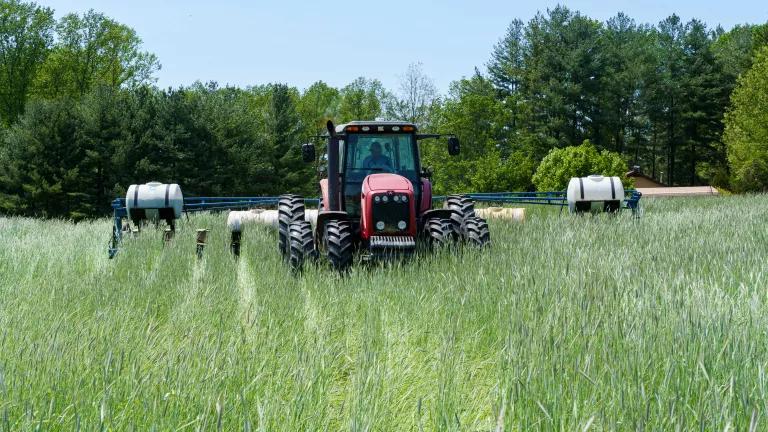Success Story: Ending Antibiotics Overuse in Chicken
The majority of U.S. chicken sold last year was produced without antibiotics. This positive change helps protect people from drug-resistant infections.

Source: U.S. FDA 2017 Summary Report on Antimicrobials Sold or Distributed for Use in Food-Producing Animals, December 2018
Source: U.S. FDA 2017 Summary Report on Antimicrobials Sold or Distributed for Use in Food-Producing Animals, December 2018
Chick-Fil-A today announced all of its chicken is now raised without the routine use of antibiotics, making good on a 2014 pledge. It’s the latest major fast food chain to reach this laudable goal—joining the likes of Chipotle, Panera, McDonald’s, Subway, KFC and more.
This reflects a stunning antibiotics success story that has unfolded across the U.S. chicken industry in the last decade.
The vast majority—a whopping 92%—of U.S. chicken sold last year was produced without the use of antibiotics considered medically important by FDA, according to an industry report released earlier this year. Much of that change in chicken has happened in a few short years: with antibiotics use dropping roughly 73% between 2013 and 2017, based on NRDC calculations drawing on data from another industry report released in August. (That drop may be even bigger—fewer companies participated in the survey in 2013 than in 2017 and use still dropped 73%.)
This positive change will help protect people from the growing health threat posed by drug-resistant infections, an epidemic fueled in large part by antibiotics overuse, including in livestock. New estimates put the death toll from antibiotic-resistant infections in the U.S. at over 160,000 deaths a year, which would make it the third-leading cause of death in the U.S.
And it’s a success story that we are really proud of here at NRDC because, together with our allies, we have played a big role in driving this change.
When we first started working on this issue, responsibly raised chicken was a niche product. There were a few regional producers raising birds without routine antibiotics use in different parts of the country. No major chicken company, however, had publicly committed to ending the routine use of medically important drugs.
So NRDC and our allies began pushing for change. It started with a groundbreaking lawsuit against FDA that kick-started a reluctant agency into lumbering action after its efforts to reduce antibiotic use had been in virtual hibernation for 35 years. We followed up with added pressure on the agency to improve its policies, which resulted in modest, but clear improvements in antibiotic use practices.
With progress in Washington moving, but slowly, we turned our attention to pushing progress forward through other avenues. We pressured the chicken industry to change its practices and won antibiotic use reduction commitments from Foster Farms, a major chicken producer, as well as some of the largest chicken buyers in the restaurant industry like McDonald’s, Subway, and Kentucky Fried Chicken.
We have also pushed states and cities to lead on this issue, resulting in important new policies from Maryland, California, and San Francisco that changed the rules on livestock antibiotic use and disclosure practices.
Together, this advocacy has brought us to where we are today: past the tipping point for the entire chicken industry. That is amazing progress.
The beef and pork industries, however, remain far behind. Both continue to use large quantities of antibiotics on animals—accounting for nearly 80% of all livestock sales of medically important antibiotics in the U.S. in 2017. (And it’s compounded by a hugely problematic culture of secrecy.)
To solve the drug resistance problem, these industries must follow the lead of chicken.
We are starting to see glimmers of hope: In December, McDonald’s became the first major burger chain—and by far the largest—to address antibiotics overuse in beef. It joined other fast-food companies like Chipotle and Panera in addressing the problem. But most other fast food chains—including burger giants like Burger King and Wendy’s—have yet to act.
As we all take time to celebrate how far we have come on chicken, we’re sharpening the focus on the rest of the meat industry. Nearly every single one of us will rely on these miracle drugs to make us healthy in our lifetimes. It’s time to stop squandering them, and for the beef and pork industries to clean up their act.
This blog provides general information, not legal advice. If you need legal help, please consult a lawyer in your state.





